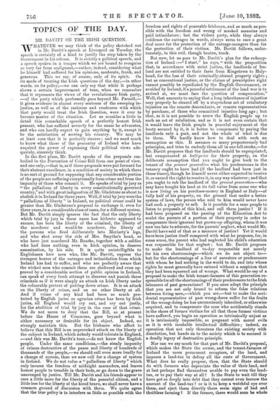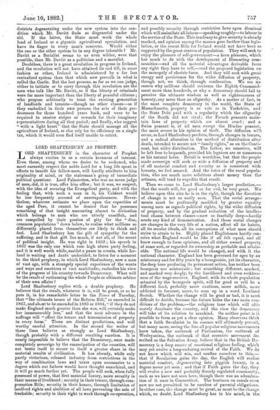TOPICS OF THE DAY.
MR. DAVITT ON THE IRISH QUESTION.
WHATEVER we may think of the policy sketched out in Mr. Davitt's speech at Liverpool on Tuesday, the speech is certainly of a kind to justify the step taken by the Government in his release. It is strictly a political speech, and a speech spoken in a temper which we are bound to recognise as very far from malignant,—rather, indeed, considering what he himself had suffered for his opinions, moderate, frank, and generous. This we say, of course, only of its spirit. On its mode of treating the Irish questions of the day,—in other words, on its policy,—we can only say that while it perhaps shows a certain improvement of tone, when we remember that it represents the views of the revolutionary Irish party, —of the party which professedly goes beyond Mr. Parnell,— it gives evidence in almost every sentence of the sweeping in- justice, as well as of the rashness and crudeness with which that party would treat the Irish Question, were it ever to become master of the situation. Let us consider a little in detail this remarkable speech of a perfectly honest Irish peasant, who has suffered severely for the cause he advocates, and who can hardly expect to gain anything by it, except it be the satisfaction of serving his country. We may be at least sure that it is perfectly sincere ; and we need much to know what those of the peasantry of Ireland who have acquired the power of expressing their political views ade- quately, sincerely think.
In the first place, Mr. Davitt speaks of the proposals em- bodied in the Prevention of Crime Bill from one point of view, and one only,—that is, as if these proposals were put forward for their abstract excellence, in a condition of society in which there is no sort of ground for supposing that any considerable portion of the people are suffering exceptionally from crime and from the impunity of those who commit it. He speaks of trial by jury as "the palladium of liberty in every constitutionally governed country," and with great indignation of Mr. Gladstone as about to abolish it in Ireland for three years. Well, if trial by jury were the "palladium of liberty" in Ireland, no political crime could be greater than Mr. Gladstone's proposal to exchange it, even for three years,in a considerable class of cases, for a different system. But Mr. Devitt simply ignores the fact that the only liberty which trial by jury in these cases has hitherto appeared to ensure, has been the liberty of the criminal, the liberty of the murderer and would-be murderer, the liberty of the persons who fired deliberately into Moriarty's legs, and who shot away the side of Mrs. Smythe's head, or who have just murdered Mr. Bourke, together with a soldier who had done nothing, even in Irish opinion, to deserve assassination, by his side. It is quite unintelligible to Englishmen how men who, like Mr. Davitt, express the strongest horror of the outrages and intimidation from which Ireland has had to suffer, and who are perfectly aware that the wicked men who commit them are sheltered and even ap- proved by a considerable section of public opinion in Ireland, can speak of evely fresh attempt to discover and punish these criminals as if it were simply an attack on Irish liberty under the colourable pretext of putting down crime. It is an attack on the liberty of clime, and on no other liberty at all. And if crime of any kind had been as much pro- tected by English juries as agrarian crime has been by Irish juries, all England would cry out, and cry out justly, for the abolition of trial by jury in the case of that crime. We do not mean to deny that the Bill, as , at present before the House of Commons, goes beyond what is either necessary or desirable for its object. Indeed, we strongly maintain this. But the Irishmen who affect to believe that this Bill is an unprovoked attack on the liberty of the subject in Ireland, which nobody would tolerate in England, —and this was Mr. Davitt's tone,—do not know the English people. Under the same conditions,—the steady impunity of crimes destructive of the peace and liberty of hundreds of thousands of the people,—we should call even more loudly for a change of system, than we now call for a change of system in Ireland. We do not value a "palladium of liberty" which only insures the freedom of midnight marauders, and leaves honest people to tremble in their beds, or go down to the grave unavenged by justice. Till Mr. Devitt and his friends appear to care a little more for the liberty of the peaceful citizen, and a little less for the liberty of the hired bravo, we shall never have a common ground of discussion with them. We quite agree that the true policy is to interfere as little as possible with the
freedom and rights of peaceable Irishmen, and as much as pos- sible with the freedom and wrong of masked assassins and paid intimidators ; but the violent party, while they always emidemn the outrages in words, always seem to care a great deal more for the protection of the outrage-mongers than for the protection of their victims. Mr. Davitt follows, unfor- tunately, in this evil, though beaten, track.
But now, let us pass to Mr. Davitt's plan for the redemp- tion of Ireland :—" I start," he says, "with the proposition. that, in accordance with strict justice, the landlords of Ire- land are not entitled to their fares from Kingstown to Holy- head, for the loss of their criminally-abused property rights ; but as conventional justice, or the claims of prescriptive right cannot possibly be repudiated by the English Government, or avoided by Ireland, if a peaceful settlement of the land war is to arrived at, we must face the question of compensation." Well, that amounts to saying that a long inheritance of injustice may properly be cleared off by a stupendous act of retaliatory injustice on the remote descendants, or remote representatives by purchase, of those who committed injustice long ago ; but that, as it is not possible to• screw the English people up to. such an act of retaliation, and as it is not even certain that it would leave the Irish people in peaceful enjoyment of the booty secured by it, it is better to compensate by paying the landlords only a part, and not the whole of what is due to them. We hardly know how to deal with such an assumption as this. It assumes so many preposterously bad principles, and tries to embody them all in one fell stroke,—for Mr. Davitt proposes that the landlords should be expropriated, but compensated at hall-priee for their property, on the deliberate assumption that you ought to give back to the tenant of the present generation what his predecessors in the tenancy ought to have had (if the landlord had been just in those times), though he himself never either expected to receive it, or earned the right to receive it, in any way whatever; and that you ought to rob the landlord of the present generation—who may have bought his land at its full value from some one who is now living on his purchase-money in England or Italy—of fully half of his property, on the ground that under a better system of laws, the person who sold to him would never have had such a property to sell. Is it possible for a sane people to listen to proposals of this kind, and call them justice ? If it had been proposed on the passing of the Education Act to mulct the parents of a portion of their property in order to compensate their ignorant but grown-up offspring, whom it was now too late to educate, for the parents' neglect, what would Mr. Davitt have said of that as a measure of justice? Yet it would have been justice itself compared with what he proposes, for, in some sense, the parent who had neglected his child's education was responsible for that neglect ; but Mr. Devitt proposes to make the landlord of to-day responsible not merely for his own shortcomings—which we do not object to— but for the shortcomings of a line of ancestors or predecessors with whom he had nothing in the world to do, and into whose rights he must generally have entered without a suspicion that they had been squeezed out of wrongs. What would he say of a proposal to make the Irish tenant-farmers of this generation re- sponsible for all the shortcomings of their predecessors to the Irish labourers of past generations? If you once adopt the principle that you are not only bound to reform the false relations between living men,—which you are,—but to make the acci- dental representative of past wrong-doers suffer for the fruits of the wrong-doing he has unconsciously inherited, or otherwise acquired, and to compensate the man who accidentally stands in the shoes of former victims for all that those former victims have suffered, you begin an operation as intrinsically unjust as it is intrinsically impossible, as pregnant with moral evils as it is with insoluble intellectual difficulties ; indeed, an operation that not only threatens the existing society with dissolution, but hands on to the society which is to succeed it a deadly legacy of destructive principle.
Nor can we say much for that part of Mr. Davitt's proposal, which makes the State the owner, and the tenant-farmers of Ireland the mere permanent occupiers, of the land, and imposes a land-tax to defray all the costs of Government. What does he really propose, then, that the State should do with farmers who depreciate the value of their land, and at last perhaps find themselves unable to pay even the land- tax, or to pay their way at all ? Is the State to wait till they have got so deeply into debt that they cannot even borrow the amount of the land-tax ? or is it to keep a watchful eye over them, and eject them directly there seem signs of bad and thriftless farming If the former, there would soon be whole
districts degenerating under the new system into the con- dition which Mr. Devitt finds so disgraceful under the old. If the latter, the State must work the whole land of Ireland as a gigantic agricultural speculation, and have its finger in every man's concerns. Would either the one or the other system be in any degree tolerable ? Mr. Devitt as a Socialist seems to us even wilder, were that possible, than Mr. Davitt as a politician and a moralist. Doubtless, there is a great revolution in progress in Ireland, and the revolution will not have attained its end till, in some fashion or other, Ireland is administered by a far less centralised system than that which now prevails in what is called the Castle. But the last persons, as far as we can judge, either to initiate or to carry through this revolution are the men who talk like Mr. Devitt, as if the liberty of criminals were far more important than the liberty of peaceful citizens ; who propose arbitrarily to treat the existing generation of landlords and tenants--though no other classes—as if they embodied in their own persons the acts of their pre- decessors for three hundred years back, and were to be required to receive stripes or rewards for their imaginary representatives during all that period; and finally, who suggest " with -a light heart" that the State should manage all the agriculture of Ireland, or else rely for its efficiency on a single tax, which it would soon find itself unable to extort.





































 Previous page
Previous page